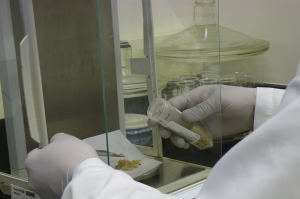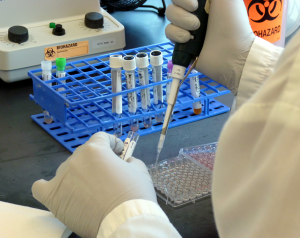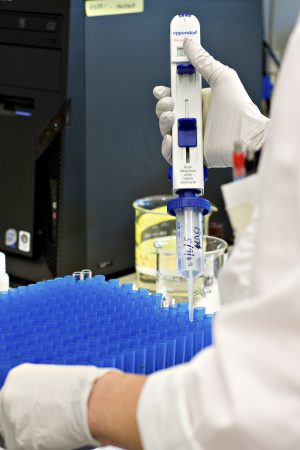
Each year, National Medical Laboratory Professionals Week is celebrated during the last full week in April. Created to recognize the important roles that laboratory professionals, scientists, and diagnosticians play in healthcare, this year the celebration is even more important, and for me personally, more poignant as I see the tremendous sacrifices made by our colleagues facing the largest human health crisis since perhaps the 1918 influenza pandemic. This year, Laboratory Professionals Week comes at a time when the world is facing a global health crisis and laboratory professionals continue their essential work even in areas where stay at home orders are in place. At the Michigan State University Veterinary Diagnostic Laboratory (MSU VDL), part of the College of Veterinary Medicine, the critical work of protecting human and animal health has not stopped.
The current coronavirus pandemic has put a new spotlight on laboratory professionals and what they do. What is apparent from the stories shared on national television, the internet, and other media, is that diagnostic testing is a complex process with multiple steps and relies on many team members. After a sample is collected from an individual who needs laboratory testing, it’s up to a team of laboratory professionals to ensure that the sample moves quickly through the process, the correct tests are ordered, and that accurate and timely results are reported back.
Case Submission
At the VDL this process begins with client services staff who answer phone calls and assist clients with questions or requests on tests, postmortem examinations and/or cremation. Packages are received from multiple carriers throughout the day and are carefully opened by receiving staff who then reconcile the samples and forms, bar-code label all samples and forms, and perform data entry into our electronic laboratory information management system so that every single sample is recorded and trackable. Our necropsy (postmortem) staff help owners safely unload animals for necropsy.

Laboratory Testing and Analysis
This is probably the image that most people have of laboratories—people in white lab coats and gloves working at a bench, or maybe at a biosafety cabinet. They could be transferring a sample from a tube to a well in a test plate, streaking a plate filled with a special media to grow a bacterial culture, adding reagents to a sample so that it can go to the next step in the testing process, centrifuging or incubating a sample… The activities that happen at the bench require scientific and technical knowledge, attention to detail, and carefully following standard operating procedures so that tests are performed the same way every single time.
Postmortem Examination
Just like postmortem examinations play an important role in human medicine, they are equally important in veterinary medicine. Pathologists and technicians conduct postmortem examinations on the necropsy floor (specially designed rooms at the Lab) to help determine an animal’s cause of death. A thorough postmortem examination, along with additional tests including microscopic tissue examination as needed, provides answers to concerned pet owners, but even more importantly can provide information to food animal producers about possible health risks to other animals in the herd. Identification of infectious disease, environmental exposure to toxins, and feed imbalances are just a few examples of postmortem diagnoses that could help save the lives of other animals. Postmortem examinations can also reveal diseases that could pose a risk to people and can assist law enforcement agencies in investigations of possible animal abuse or neglect.

Reporting and Operations
Business office staff process and collect payments, generate and prepare statements, and set up new client accounts. IT staff keep the laboratory information management system running, provide desktop support, manage the network, maintain important equipment interfaces, and ensure required regulatory reporting tools are functioning. Administrative staff provide oversight of the laboratory facility, finances, human resources, quality assurance, and communications.
Every member of the VDL plays a critical role in ensuring that our clients get the important test results, data, and scientific input needed on each submission.
One Health
While the MSU VDL does not test samples collected from humans, the tests that the Diagnostic Laboratory perform each day protect people from diseases that could be transmitted by food animals through the food chain; diseases that are spread from wildlife to humans, companion animals, and livestock by vectors such as mosquitos and ticks; and zoonotic diseases that could be transmitted by companion animals through direct contact.

Responding to the Coronavirus Pandemic
For veterinary diagnostic laboratories, massive disease outbreaks such as the highly pathogenic avian influenza outbreak in 2015 have provided harsh lessons that have changed how we prepare for such events. At the MSU VDL, we have worked with local and national agencies to drill and prepare, and in some cases, provide testing for large-scale adverse animal health events. The current pandemic has challenged us to continue testing for high-consequence diseases to protect human and animal health, while simultaneously adapting our staffing and procedures to protect our team and clients, and working to develop testing capabilities to detect the virus that causes COVID-19.
During normal operations, the MSU VDL receives between 400-800 packages daily. These could be samples from companion or farm animals; zoo, wildlife, or exotic species; or non-animal samples such as feed. When the state of Michigan implemented a Stay Home, Stay Safe order in late March, the MSU VDL asked veterinarians to submit only samples for which diagnostics play a critical role in managing or treating an animal’s illness. This came at a time when veterinarians were already beginning to scale back services in clinics to ensure better social distancing for their staff members and animal owners. Currently, submissions are down about 45% and the Laboratory is still receiving 200-300 packages per day. That is because the work we do is critical to our clients and to the patients that are entrusted to their care.
The entire laboratory team at the MSU VDL contributes to our mission to protect, investigate, educate, and collaborate. Whether they are in a lab coat or at a desk, every team member directly or indirectly supports our ability to get results to clients throughout Michigan, across the United States, and around the world. We continue to do this important work in the face of current challenges, and will certainly face new ones in the future. We are here and we are ready.
